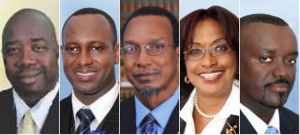By Caribbean News Now contributor
PROVIDENCIALES, Turks and Caicos Islands — When the hearing of the election challenges brought by Acting Attorney General Rhondalee Braithwaite-Knowles resumed on Tuesday in the Turks and Caicos Islands (TCI), the chief justice consented to the withdrawal of the remaining five applications against sitting members of the House of Assembly.
 On Friday, March 9, Braithwaite-Knowles had filed a total of six challenges based on late or inadequate filing of notices with the Integrity Commission of interests in government contracts. Only one of such challenges was brought within the statutory five-day time limit – that against Amanda Misick, Progressive National Party (PNP) candidate in the Cheshire Hall/Richmond Hill by-election.
On Friday, March 9, Braithwaite-Knowles had filed a total of six challenges based on late or inadequate filing of notices with the Integrity Commission of interests in government contracts. Only one of such challenges was brought within the statutory five-day time limit – that against Amanda Misick, Progressive National Party (PNP) candidate in the Cheshire Hall/Richmond Hill by-election.
Last month, Braithwaite-Knowles argued before Chief Justice Edwin Goldsbrough in the Supreme Court in Grand Turk that Misick was disqualified from election as a result of her late filing of a required declaration of interests in government contracts.
However, the chief justice ruled against the acting attorney general in the Misick matter, thus allowing a by-election to go ahead as planned.
Out of time challenges by the acting attorney general against five sitting members of the House of Assembly: George Lightbourne (PNP); Edwin Astwood (PDM); Derek Taylor (PDM); Josephine Connolly (PDM); and Delroy Williams (PDM) for their alleged failure to disclose government contracts prior to the general elections in November last year were also heard, at which point Braithwaite-Knowles attempted to withdraw her applications.
However, in denying this request, the chief justice indicated that there were serious issues of law to be determined, which he needed to study in depth, and accordingly adjourned the case until April 9.
The case will however apparently still proceed on a point of law, namely, whether or not a freehold interest in what was formerly Crown land but nevertheless subject to conditions in the event of resale within a ten-year period and a corresponding charge over the land in favour of the government is to be regarded as a contract with government for the purposes of the constitutional provisions mandating disclosure of interests in such contracts by election candidates.
The matter therefore seems to have turned into something similar to what in the UK would be known as an Attorney General’s Reference, where the attorney general may seek the opinion of the court on a point of law that has arisen in a case. The purpose of the procedure is to clarify the law and not affect the outcome in a particular case. The court’s decision in the matter will only affect subsequent cases.
